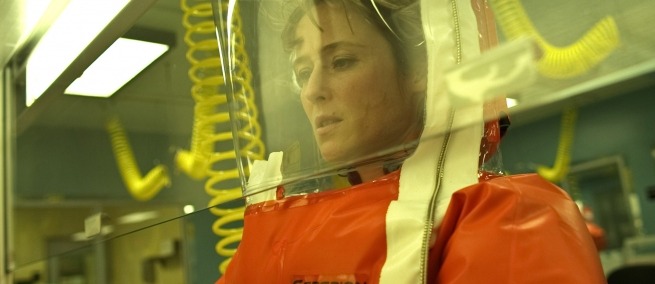
Steven Soderbergh’s 2011 thriller CONTAGION, set during the outbreak of a deadly virus, has become the fictional touchstone of the coronavirus pandemic. There has been a huge spike in rentals and the cast reunited for a PSA about stopping the spread of COVID-19. Hence, the AFI Conservatory's annual Sloan Seminar featured a conversation between CONTAGION screenwriter Scott Z. Burns and W. Ian Lipkin, a Columbia University epidemiologist who served as the science advisor for the film. The conversation was moderated by neuroscientist Moran Cerf and is available to stream exclusively below.
In terms of how CONTAGION originated, screenwriter Scott Z. Burns said, “there was a movie that I had seen when I was growing up called OUTBREAK that had Dustin Hoffman in it, that I felt, I just didn’t believe even as a kid that the science made sense. […] I started thinking, what if you did a film about a pandemic that took into account the world that we’re living in now, where there is so much global travel, and there is such a disparity in wealth, and in access to medicine, and a host of other things?” He continued, “I wanted public health people and science people to be the heroes of this story.”
Before filming began for CONTAGION, virologist W. Ian Lipkin took the film’s lead actor Kate Winslet to the Centers for Disease Control and Prevention (CDC) headquarters in Atlanta. “I introduced Kate [Winslet] to people who are right now very important in the trajectory of the COVID[-19] outbreak,” he said. “Anne Shukla is number two at CDC, a physician who is very interested in respiratory disease and is running their response; somebody named Ali Kahn who is now in Nebraska running the School of Public Health there; and Rima Khabbaz, who runs the National Center for Infectious Diseases. […] [Kate Winslet] asked them questions about what it would be like to go to an outbreak, how would they investigate.”
When Anthony Fauci, the nation’s top infectious disease expert, was invited to see CONTAGION in New York, W. Ian Lipkin said, “we got to the end, he liked the link to the bat [at the end of the film], he liked the way the EIS [Epidemic Intelligence Service] officers were portrayed, and he had one criticism: That criticism was that it was too rapid a track for the development of the vaccine. He said, ‘it takes 2-3 years to make a vaccine.’ […] We are actually going to be not far off from what was portrayed in the film.”
You can watch the full conversation exclusively below.
PARTNERS
TOPICS